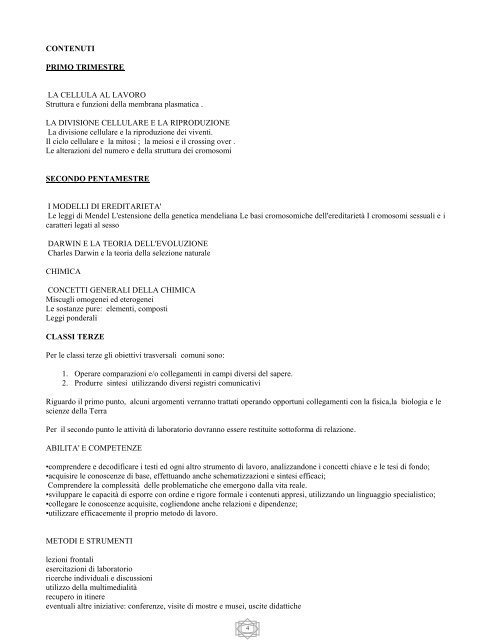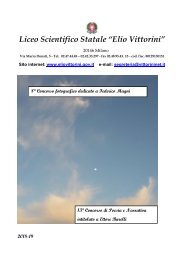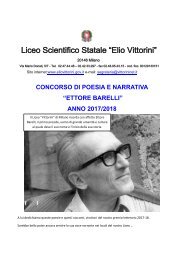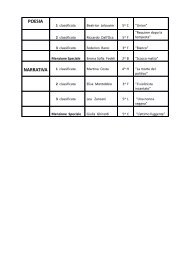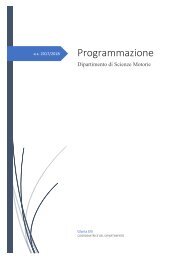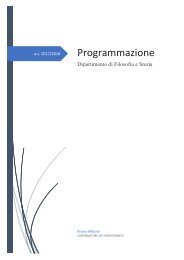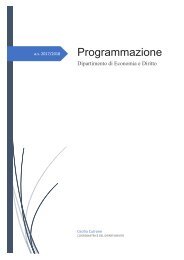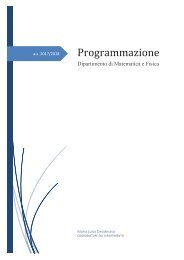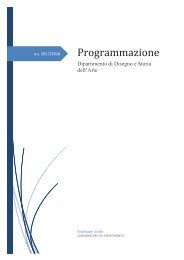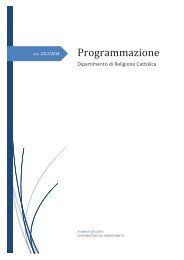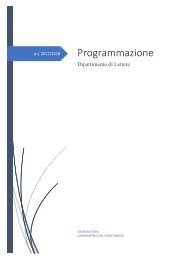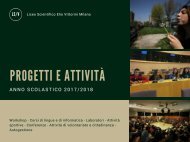Programmazione del Dipartimento di Scienze Naturali
La Programmazione del Dipartimento di Scienze Naturali è a cura della prof. Laura Penati
La Programmazione del Dipartimento di Scienze Naturali è a cura della prof. Laura Penati
Create successful ePaper yourself
Turn your PDF publications into a flip-book with our unique Google optimized e-Paper software.
CONTENUTI<br />
PRIMO TRIMESTRE<br />
LA CELLULA AL LAVORO<br />
Struttura e funzioni <strong>del</strong>la membrana plasmatica .<br />
LA DIVISIONE CELLULARE E LA RIPRODUZIONE<br />
La <strong>di</strong>visione cellulare e la riproduzione dei viventi.<br />
Il ciclo cellulare e la mitosi ; la meiosi e il crossing over .<br />
Le alterazioni <strong>del</strong> numero e <strong>del</strong>la struttura dei cromosomi<br />
SECONDO PENTAMESTRE<br />
I MODELLI DI EREDITARIETA'<br />
Le leggi <strong>di</strong> Men<strong>del</strong> L'estensione <strong>del</strong>la genetica men<strong>del</strong>iana Le basi cromosomiche <strong>del</strong>l'ere<strong>di</strong>tarietà I cromosomi sessuali e i<br />
caratteri legati al sesso<br />
DARWIN E LA TEORIA DELL'EVOLUZIONE<br />
Charles Darwin e la teoria <strong>del</strong>la selezione naturale<br />
CHIMICA<br />
CONCETTI GENERALI DELLA CHIMICA<br />
Miscugli omogenei ed eterogenei<br />
Le sostanze pure: elementi, composti<br />
Leggi ponderali<br />
CLASSI TERZE<br />
Per le classi terze gli obiettivi trasversali comuni sono:<br />
1. Operare comparazioni e/o collegamenti in campi <strong>di</strong>versi <strong>del</strong> sapere.<br />
2. Produrre sintesi utilizzando <strong>di</strong>versi registri comunicativi<br />
Riguardo il primo punto, alcuni argomenti verranno trattati operando opportuni collegamenti con la fisica,la biologia e le<br />
scienze <strong>del</strong>la Terra<br />
Per il secondo punto le attività <strong>di</strong> laboratorio dovranno essere restituite sottoforma <strong>di</strong> relazione.<br />
ABILITA' E COMPETENZE<br />
•comprendere e deco<strong>di</strong>ficare i testi ed ogni altro strumento <strong>di</strong> lavoro, analizzandone i concetti chiave e le tesi <strong>di</strong> fondo;<br />
•acquisire le conoscenze <strong>di</strong> base, effettuando anche schematizzazioni e sintesi efficaci;<br />
Comprendere la complessità <strong>del</strong>le problematiche che emergono dalla vita reale.<br />
•sviluppare le capacità <strong>di</strong> esporre con or<strong>di</strong>ne e rigore formale i contenuti appresi, utilizzando un linguaggio specialistico;<br />
•collegare le conoscenze acquisite, cogliendone anche relazioni e <strong>di</strong>pendenze;<br />
•utilizzare efficacemente il proprio metodo <strong>di</strong> lavoro.<br />
METODI E STRUMENTI<br />
lezioni frontali<br />
esercitazioni <strong>di</strong> laboratorio<br />
ricerche in<strong>di</strong>viduali e <strong>di</strong>scussioni<br />
utilizzo <strong>del</strong>la multime<strong>di</strong>alità<br />
recupero in itinere<br />
eventuali altre iniziative: conferenze, visite <strong>di</strong> mostre e musei, uscite <strong>di</strong>dattiche<br />
4


